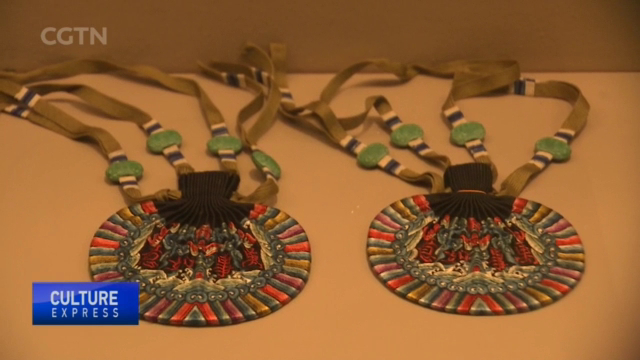
19:10, 08-Aug-2019
Qixi Festival: Couples enjoy romantic evening at Beijing's Capital Museum
Updated
19:27, 08-Aug-2019

Wednesday marked the traditional Qixi Festival, also known as Chinese Valentine's Day. To celebrate the occasion, Beijing's art museum, the Capital Museum, stayed open late and hosted a series of activities on the theme of love. Our reporter Ding Siyue was there and of course, she loved it.
It's already evening but things are still in full swing. Audiences at the Capital Museum are getting a chance to enjoy a special tour focused on the topic of love.
Guides lead the audiences through exhibition halls of folklore, jade and porcelain and tell them the stories behind the objects linked to themes of love and marriage.
WU LINGLING VOLUNTEER GUIDE "Here at the Capital Museum, we have many cultural relics related to Qixi and love and marriage. Through this tour, we can take a look at how our ancestors spent the Qixi Festival and what marriage was like in the past."
The Qixi Festival is celebrated on the seventh day of the seventh month according to the Chinese lunar calendar. It has its origins in a 2,000-year-old love story of a weaver girl and a cowherd boy.
YANG DANDAN, SPOKESPERSON CAPITAL MUSEUM "As a cultural platform, we hope the audiences can feel the rich traditional culture of China at our museum. This year is the first time we've stayed open late for Qixi. We've especially looked for exhibits related to the festival to give the audiences a themed visit experience."
DING SIYUE BEIJING "In the past, the Qixi Festival was an occasion for girls to demonstrate the domestic skills necessary for marriage. These days, it has become a romantic holiday like the western Valentine's day for couples to express their love for each other."
One attraction for visitors to take part in was a sand painting activity depicting one of the objects in the museum's collection - a jade box with Yuanyang birds, or mandarin ducks, which symbolize love in traditional Chinese culture.
"We are very happy to attend this event and learn more about the traditions of the Qixi Festival. We've traveled to many countries, and the more we visit other countries, the more interested we are in our own culture. Because these are our roots. So we very much enjoy these kinds of activities at museums."
Meanwhile, a traditional opera, Tianxianpei was played on the museum's opera stage. It tells a love story between a goddess and a human. It's certainly been an evening rich in romantic content and culture. DSY, CGTN.
SITEMAP
Copyright © 2018 CGTN. Beijing ICP prepared NO.16065310-3
Copyright © 2018 CGTN. Beijing ICP prepared NO.16065310-3